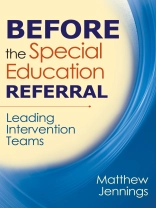’A practical approach to the real problems administrators face when dealing with intervention and referral. The writing is clear and concise, providing examples and solutions to real-world situations. This book belongs in every school administrator′s professional library.’
—Jack Dennis, Principal
Columbia Middle School, Berkeley Heights, NJ
Develop an efficient prereferral intervention process that truly benefits students!
Prereferral intervention teams can dramatically improve academic achievement for struggling students by providing focused instructional interventions and support before a referral for special education evaluation is needed. This resource presents school leaders with a step-by-step, four-phase model for developing, leading, and evaluating effective prereferral intervention teams.
The author provides numerous reproducible tools that can be used for facilitating implementation and staff training. Featuring a running example that illustrates the model in action, this book shows how school leaders can:
- Establish prereferral intervention teams by assessing school needs, determining the composition of the team, defining team roles, and conducting staff training
- Use prereferral intervention teams to support the Response to Intervention process
- Enhance the collaborative strengths of a professional learning community
Before the Special Education Referral enables educators to apply the practical steps necessary to greatly improve the quality of prereferral intervention programs.
Innehållsförteckning
Preface
Acknowledgments
About the Author
1. An Introduction to Prereferral Intervention Teams
Variations on a Theme
Educational Leader′s Role
Conclusion
2. The Analysis and Decision-Making Phase
Costs and Benefits
Establishing and Analyzing the Task
Establishing Authority
Conclusion
3. The Planning and Preparation Phase
Determining Group Composition
Designing and Communicating the Task
School and District Supports
The Team Charter
Conclusion
4. The Start-Up Phase
Team Boundaries
Task Redefinition
Norms and Roles
The Start-Up Meeting
The Importance of the Start-Up Meeting
Initial Prereferral Intervention Team Training
Staff Awareness
Staff Training
Conclusion
5. The Assistance Phase
Eliminating Barriers
Technology
Reflection Activities
Assistance With Group Processes
Conclusion
6. Evaluating Prereferral Intervention Teams
Evaluation Tools
Data Analysis and Action Planning
Conclusion
7. Connecting Prereferral Intervention Teams and Response to Intervention
The Connection
Implementation Decisions
Universal Screening Decisions
Intervention Tier Decisions
Intervention Management Team Training and Staff Awareness
The Combined Process
Identifying the At-Risk Pool
Tier Placement
Conclusion
Final Thoughts
Resource A: Putting It All Together: The Implementation Plan
Resource B: Implementation Tools
References
Index
Om författaren
Matthew Jennings is currently the superintendent of schools for the Alexandria Township Public School System. Prior to serving in this position, Jennings served as an assistant superintendent of schools, a director of student services, a supervisor of curriculum and instruction, and a classroom teacher. In addition to presenting at numerous state and national conferences, Jennings has served as an organizational behavior consultant to school districts throughout New Jersey. He works as an adjunct professor for Rutgers University, where he teaches courses on curriculum development, school administration, and the supervision of instruction. His work has been published in Kappan, Preventing School Failure, the New Jersey English Journal, Channels, and The Writing Teacher. His most recent publication, Leading Meetings, Teams and Work Groups in Schools and Districts, was released by the Association for Supervision and Curriculum Development in June of 2007. He earned his master’s degree and doctorate in educational administration from Rutgers University.












